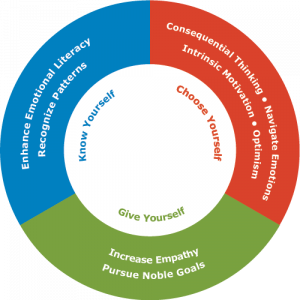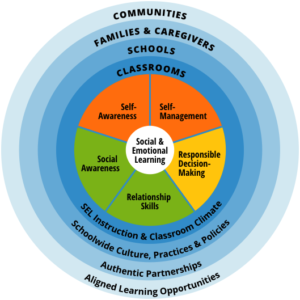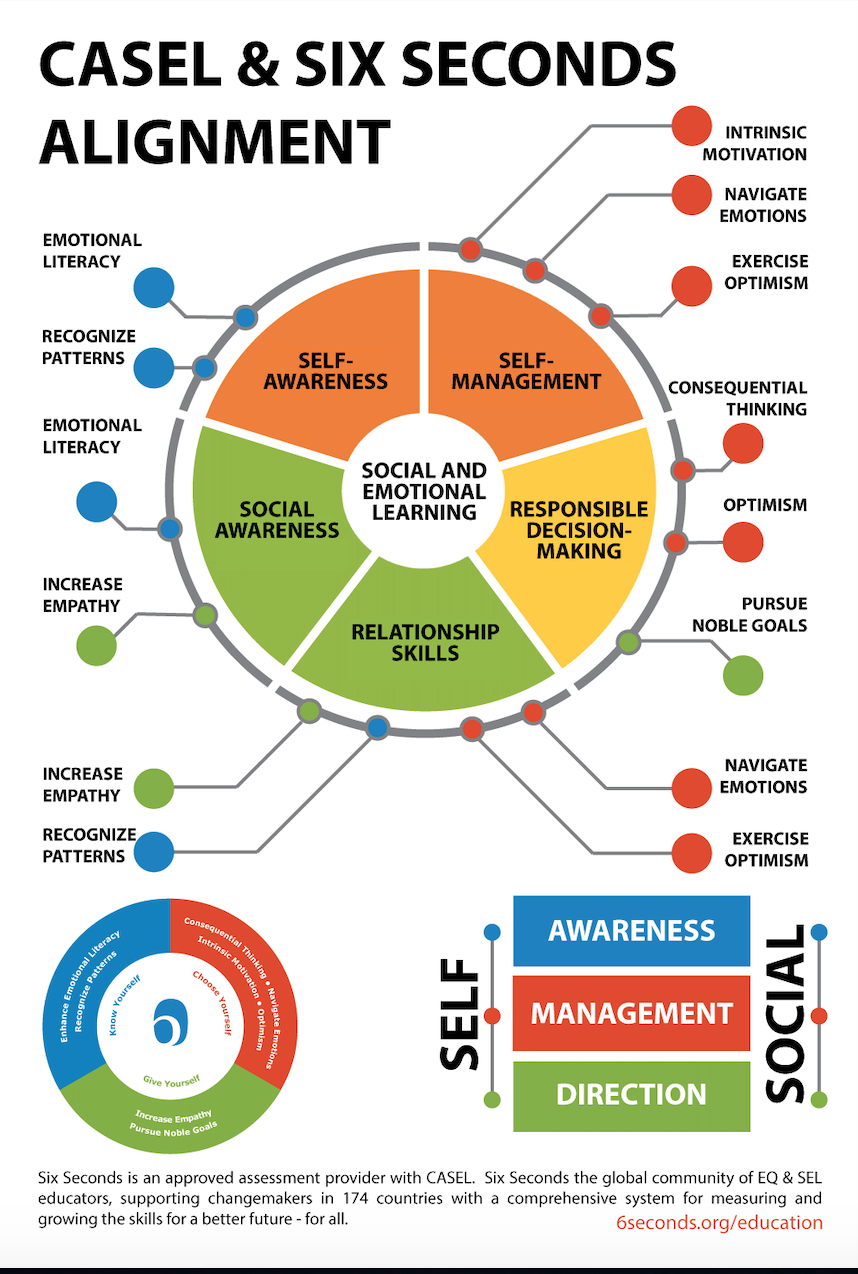Six Seconds -CASEL Alignment
The Six Seconds EQ Model moves the CASEL competencies into action.
Six Seconds and CASEL
Six Seconds is a Founding Member of the SEL Provider’s Council, originally created by CASEL, and the SEI-YV and SEI-pYV assessments are listed in the CASEL Assessment Guide. The Six Seconds Model moves the CASEL competencies into action, with specific emotional intelligence skills fueling the 5 key outcomes in the CASEL Wheel.
Here’s a comparison of the Six Seconds Model of Emotional Intelligence and the CASEL 5, and you can download a detailed alignment chart below.
Ready to implement evidence-based SEL solutions? Contact us and tell us about your most pressing needs.
Six Seconds Model of Emotional Intelligence
The Six Seconds Model of Emotional Intelligence consists of 3 pursuits – Know Yourself, Choose Yourself and Give Yourself – which are fueled by 8 emotional intelligence skills, or competencies. They’re measured through the Six Seconds Emotional Intelligence Assessment – or SEI. Here are the eight competencies – with definitions below.
Know Yourself
Clearly seeing what you feel and do.
Emotions are data, and these competencies allow you to accurately collect that information.
Choose Yourself
Doing what you mean to do.
Instead of reacting “on autopilot,” these competencies allow you to proactively respond.
Give Yourself
Doing it for a reason.
These competencies help you put your vision and mission into action so you lead on purpose and with full integrity.
Read more about the Six Seconds Model →

CASEL Wheel
The CASEL Wheel or CASEL 5 consists of five broad and interrelated areas of competence: self-awareness, self-management, social awareness, relationship skills, and responsible decision-making.
SELF-AWARENESS: The abilities to understand one’s own emotions, thoughts, and values and how they influence behavior across contexts.
SELF-MANAGEMENT: The abilities to manage one’s emotions, thoughts, and behaviors effectively in different situations and to achieve goals and aspirations.
SOCIAL AWARENESS: The abilities to understand the perspectives of and empathize with others, including those from diverse backgrounds, cultures, & contexts.
RELATIONSHIP SKILLS: The abilities to establish and maintain healthy and supportive relationships and to effectively navigate settings with diverse individuals and groups.
RESPONSIBLE DECISION-MAKING: The abilities to make caring and constructive choices about personal behavior and social interactions across diverse situations.
Read more about the CASEL Wheel →


CASEL and Six Seconds Alignment Chart
Download this free chart showing the overlap between the Six Seconds Model of Emotional Intelligence and the CASEL Wheel.
Featured Articles
Fortifying the Mental Health of the Entire School Community with Emotional Intelligence
Wellbeing program at St. Peter’s Primary replenishes reserves post-COVID: ‘Truly life changing for many of our staff,’ school leaders say. Read the full case study here.
Productive Struggle: 4 Neuroscience-Based Strategies to Optimize Learning: EQ Education News
Do you instinctively want to help students when they’re struggling? What if some level of struggle was necessary for learning? Brain-based learning researchers have discovered a sweet spot for learning called “productive struggle.” Here’s why and how it works.
Emotion Science from Inside Out 2 – EQ Education News
What do you think and feel about the emotions in Inside Out 2? Let’s unpack the science and how you can use the film to keep developing emotional intelligence skills for you, your faculty and students.
Is Boredom Bad for Kids? Emotional Intelligence Education News
Let’s unpack boredom and how emotional intelligence can help you with tips to support bored children (and keep your cool!). Keep reading for EQ research and resources you can use for you, your faculty and students.
Are you a Maximizer or a Satisficer? Tips for Better Decisions – EQ Education
Overwhelmed by decisions? Here’s how emotional intelligence can help you develop strategies to be more efficient and balanced in your decisions not defeated by them.
Four Tips to Make A Culture of Learning from Mistakes: EQ Educator News
How emotional intelligence can help you learn from mistakes and make them a vital part of learning? Keep reading for EQ research and resources you can use for you, your faculty and students.
- Emotional Intelligence at Work:In the Era of AI, What Happens to Human Skills? - November 19, 2024
- Fortifying the Mental Health of the Entire School Community with Emotional Intelligence - October 30, 2024
- Emotional Intelligence at Work: Exploring the Principles of Exceptional Leaders - October 15, 2024







A perfect statistical chart. This information is quite necessary in some cases.